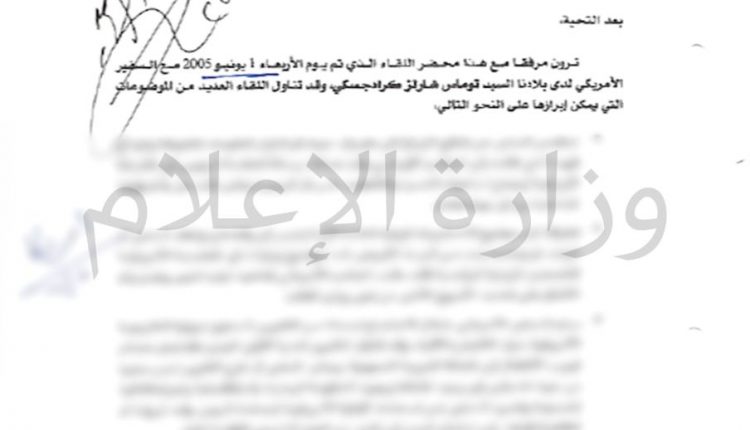The US Embassy Asks The Ex-Regime To End The Boycott Of Israeli Products
The Ministry of Information revealed official documents about the Saleh regime’s positive response to the US directives to end the boycott of Israeli goods, and its identification with Washington’s pressures related to the economic boycott.
The documents showed that successive US administrations have sought since the 1990s to push Yemen and drag it towards normalization with the Zionist entity through several preliminary methods, foremost of which is ending the economic boycott of Zionist products and not participating in anti-enemy activities.
The documents showed the extent of the American-Israeli annoyance with the boycott of their products, and the impact of this on their economy, and its call on the Saleh regime to stop the economic boycott, taking advantage of the dependence of the Yemeni regime on it at that time.
According to a document addressed by the Yemeni Undersecretary of the Ministry of Foreign Affairs to the Director of the Presidential Office, about the points of his meeting with the American ambassador on May 9, 1993, it became clear that the US State Department had carried out a campaign of pressure on the Yemeni authority at the time to open the country to the goods of the Zionist enemy and the companies associated with it.
The letter included a request to the US ambassador at the time to reconsider the boycott policy imposed on American companies that have a relationship with Israel.
The documents confirm that the Ali Saleh regime has dealt positively with US directives to end the boycott of Israeli goods.
In the minutes of the meeting of then Yemeni Foreign Minister Abu Bakr al-Qirbi with the American ambassador in Sana’a Thomas Kardzejsky on June 1, 2005, it was found that America was able to use Saleh’s authority to calculate the lifting of the Arab boycott system against the Zionist entity.
The documents revealed by the Ministry of Information include a memorandum classified under the title “Urgent” issued by the US Embassy in Sana’a on November 4, 2007, addressed to the Yemeni Foreign Ministry. Arabic in the Central District Office in Damascus from 5 to 7 November 2007 AD.
The embassy memo stated that “the Arab boycott meeting not only represents an obstacle to peace in the Middle East; But it also constitutes a barrier to participating in the global economy, attracting foreign investment, expanding trade, and improving relations with the United States and the international community.”
The US embassy has traded Yemen’s facilitation of accession to the World Trade Organization by abandoning the boycott of Israeli goods and services, as the cable said, “Yemen’s accession to the World Trade Organization requires the government of the Republic of Yemen to abandon its initial boycott of Israeli goods and services.”
The same document also reveals that the US administration was implementing a wide campaign of pressure targeting the Arab countries whose people adhere to the boycott, as it was stated in the telegram, “The time has come for the Arab League to decide to close the central district office in Damascus.”
The Ministry of Information, which is publishing these documents to the public as evidence of the American guardianship imposed on Yemen before the September 21 revolution, stresses the importance of the economic boycott of American and Israeli products and their effectiveness in harming enemies.
The ministry called on the Yemeni people to activate the weapon of the economic boycott of American and Israeli goods, as it is one of the lethal weapons directed at the enemies of the nation and which they are greatly disturbed by, stressing at the same time the need to continue to support the Palestinian people and confront the American-Saudi aggression on Yemen until victory.
The disclosure of these documents comes in light of the American efforts in support of the Zionist entity and the identification of Arab regimes with those tendencies aimed at normalization with the Israeli enemy.
The US Embassy asks the ex-regime to end the boycott of Israeli products
السابق 1 من 10 التالي














